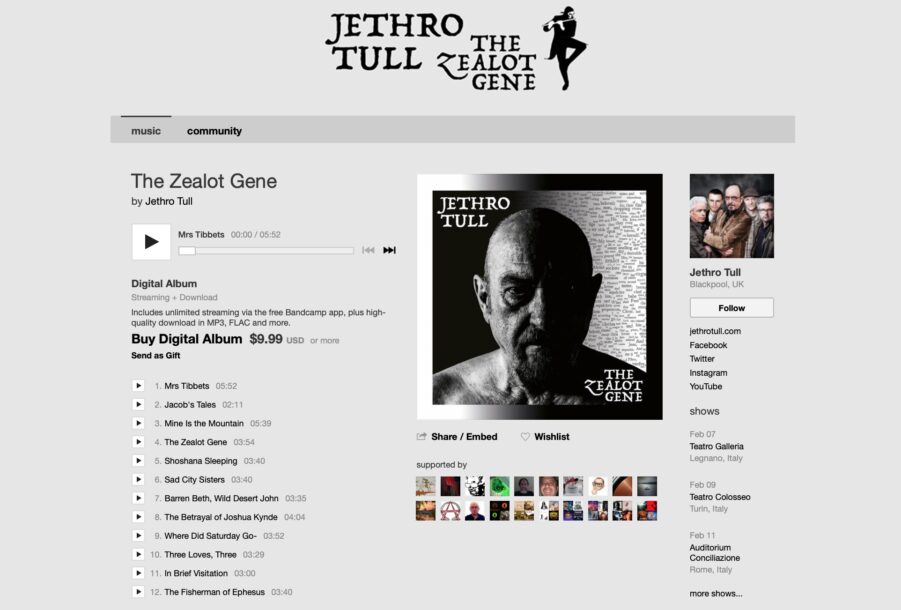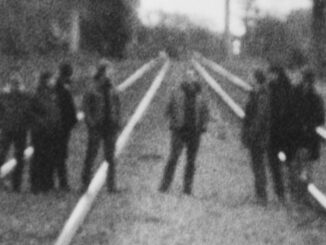
By AVA LIVERSIDGE
Ian Anderson, the best flautist in Rock N’ Roll, has been busy for the past couple of decades with various solo projects and English farm life so when Jethro Tull reassembled for The Zealot Gene, they ostensibly decided to Go Tull or Go Home. Jethro Tull’s latest record, The Zealot Gene is the group’s first LP since 1999’s J-Tull Dot Com (save their Christmas album in 2000).
Every single oddity, conception, and murmuring that you hear about Jethro Tull’s music–from their propensity to sound like the soundtrack to a Renaissance Fair to their oftentimes jarring, unsettling lyrics–are in legion on The Zealot Gene. Janis Joplin famously sang, “Freedom’s just another word for nothing left to lose.” On this record, after a lifetime of titillating audiences with an alternative interpretation of what rock music can sound like, Jethro Tull and Ian Anderson are fully free to be.
Anderson and group revisit the religious quandaries that founded their seminal record, Aqualung more than half of a century ago. Across the record, bucolic scenes of primeval pastures flow from agile flute passages and strumming acoustic guitars, but these green pastures only set the scene for Anderson’s confrontation with mythology and religion; sometimes he plays the imperious God, sometimes the distraught worshipper.
Four seconds into the album opener, “Mrs. Tibbets,” the listener is left with no doubt of whose record it is– Anderson’s flute leads directly into disparately harsh drumming. Anderson already invokes images of “burning flesh and melted heat” and bitter “what ifs, ” about Judas, Peter, and the martyrdom of Mrs. Tibbets’ son. We also hear one of the rare guitar solos on this largely acoustic record. The following track, “Jacob’s Tales,” introduces The Zealot Gene’s narrative source in earnest.

Here, Anderson begins to negotiate bygone myths and parables while telling one himself– this is a fitting task for the band that has a knack for transforming into medieval troubadours, taking their audiences along into the Dark Ages. The track is also an apt place to begin to reminisce on bygone tales as the harmonica opener and harshly-picked guitar harkens back to Tull’s very first pre-flute, blues-rock records. A very menacing interpretation of God is then revealed on “Mine Is The Mountain,” and a piano-and flute-driven rock ballad ensues. Anderson hypnotizes: “But you who ignore these things that are written / will define the story your children will read,” and the mythologizing at the crux of Tull’s singularity is further revealed.
Title track “The Zealot Gene” also offers a foreboding warning, this time about the dangers of general extremism and the wily, uncontained flame that is human zeal. The critique is backed by a repetitious melody making for a nearly catchy tune, however unlikely a fate that may be for the subject matter.
The latter half of the record, beginning with the single “Shoshana Sleeping,” is where Tull not only transports the listener to some antediluvian festival but stays there. Trilling flute is plentiful and a Gaelic diffidence in the face of nature’s great beauty facilitates a general instrumental whimsy. Jethro Tull possesses the singular ability to sound so distinctly like an anachronism while still undoubtedly contributing to the progressive rock genre. The next single, “Sad City Sisters,” sees Anderson continuing his relentless quandaries whilst masquerading as practically any character.
The cut follows the story of two sinning women, but their tale occurs just beyond the physical, in the semi-feasible ether wherein outwardly posed questions triumph over factual concerns; elfin flute and jangling guitar strings create the occasion for such an ethereal foray. “Barren Beth, Wild Desert John” recounts a cynical story of a decaying family tree (all with biblical names), coming to climax with the characteristic Jethro Tull flute-guitar solo showdown in which the two instruments trade-off for a truly epic instrumental interlude. “The Betrayal of Joshua Kynde” tells an Old Testament-esque tale of delights in deceit, but with a cabaret-style piano arrangement.
The next three cuts proffer plenty of agrarian scenes of rolling pastures and good shepherds– a spritely countryside– that portend the sacred oaths and spirits that become the objects of Anderson’s questioning. The leading flute posits Anderson alone on one of these picturesque landscapes, full of inquietudes and questions, forever being posed back to himself. In this, he is a shape-shifter, both questioning and all-knowing, which, truthfully, is the duty of a good raconteur. “Three Loves, Three” and “In Brief Visitation” are a duet of love songs, one leading seamlessly into the other; the former is a wistful song of romance lost while the latter is a spiteful take on Anderson’s unimpressive lot of potential lovers (doubling as another critique of blind bipartisanship).
“The Fisherman of Ephesus” closes The Zealot Gene with a final rumination on story-telling, electrifying our “happily ever after” with amplified guitar and intensifying flute passages across this misty mountainscape. Anderson finally assumes what seems to be an auto-biographical role as the track tells the legend of the fabulist himself. Anderson reflects on his role: “To spin the lure and reel them in.”
On The Zealot Gene, Jethro Tull grapples with what it means to revive the past, to be a raconteur, and how such an antiquated concept has essentially remained steadfast since the primordial days when the flautists were numerous. Anderson makes the case for the perennial importance of the minstrel.



